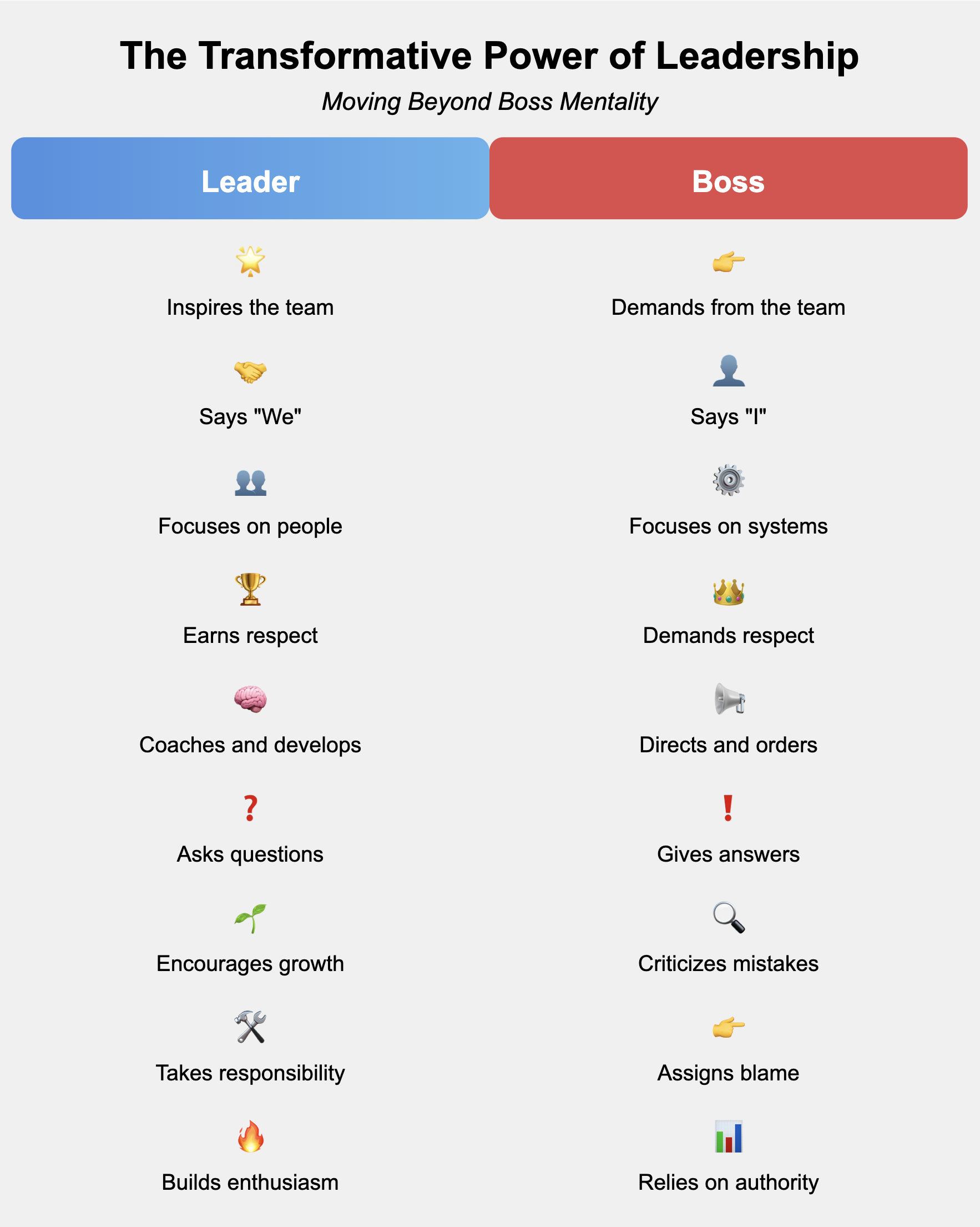The Transformative Power of Leadership: Moving Beyond Boss Mentality
As modern workplaces evolve, the boss-leader dichotomy will define the future of work. The distinction between a leader and a boss has become more than just semantics—it's a fundamental shift in philosophy that can make or break organizations. As we navigate the complexities of the 21st-century workplace, understanding and embracing true leadership has never been more crucial.
The Paradigm Shift: From Command to Inspiration
Traditionally, the corporate hierarchy has been dominated by the "boss" figure—an authoritative presence focused on giving orders and maintaining control. However, as we've progressed into an era valuing innovation, collaboration, and employee empowerment, the limitations of this outdated model have become glaringly apparent.
Enter the leader: a visionary who goes beyond mere management to inspire, empower, and cultivate growth. Leaders understand that their role isn't just about directing traffic; it's about charting a course towards a compelling future and bringing out the best in those around them.
The Heart of Leadership: Empathy and Vision
At its core, leadership is about human connection. While a boss might view employees as cogs in a machine, a leader sees each team member as a unique individual with untapped potential. This empathetic approach allows leaders to:
Understand individual motivations: By taking the time to know their team members personally, leaders can align individual aspirations with organizational goals.
Foster a culture of trust: Open communication and vulnerability from the top create an environment where creativity and risk-taking can flourish.
Inspire through purpose: Leaders connect daily tasks to a greater mission, infusing work with meaning and driving intrinsic motivation.
Lead by example: Instead of demanding respect, leaders earn it by embodying the values and work ethic they expect from others.
The Ripple Effect: How Leadership Transforms Organizations
The impact of true leadership extends far beyond immediate team dynamics. When leadership principles permeate an organization, the effects can be transformative:
1. Unleashing Innovation
Leaders create safe spaces for experimentation and view failures as stepping stones to success. This approach nurtures a culture of innovation where:
Employees feel empowered to voice unconventional ideas
Cross-functional collaboration becomes the norm, leading to breakthrough solutions
Continuous improvement becomes ingrained in the organizational DNA
2. Cultivating Resilience
In times of crisis or change, the difference between a boss and a leader becomes stark. Leaders:
Maintain composure and provide a steady hand during turbulent times
Communicate transparently, even when the news is difficult
Rally teams around a common purpose, turning challenges into opportunities for growth
3. Building a Legacy of Leadership
Perhaps the most profound impact of leadership is its self-perpetuating nature. True leaders:
Actively mentor and develop future leaders within the organization
Create succession plans that ensure continuity of vision and values
Leave a lasting imprint that extends beyond their tenure
The Journey from Boss to Leader: A Path of Personal Growth
Transitioning from a boss mentality to embodying true leadership is a journey of self-discovery and continuous improvement. It requires:
Self-awareness: Recognizing one's strengths, weaknesses, and impact on others
Emotional intelligence: Developing the ability to understand and manage both personal and others' emotions
Lifelong learning: Continuously seeking new knowledge and perspectives
Embracing vulnerability: Being open about mistakes and uncertainties, which paradoxically strengthens leadership presence
The Call to Lead: Your Role in the Leadership Revolution
As we stand at the crossroads of traditional management and transformative leadership, each of us has a choice to make. Will we cling to outdated notions of authority and control, or will we embrace the challenges and rewards of true leadership?
The world is crying out for leaders at every level—in businesses, communities, and global initiatives. By choosing the path of leadership, you're not just changing your own approach; you're becoming part of a global movement towards more empathetic, innovative, and purpose-driven organizations.
Remember, leadership isn't about titles or positions. It's about influence, inspiration, and impact. Whether you're a CEO or a new team member, you have the power to lead by example, to lift others up, and to contribute to a culture of excellence and growth.
Conclusion: The Leader Within
As we've explored the profound differences between bosses and leaders, one truth becomes clear: leadership is not just a set of actions, but a mindset and a way of being. It's about seeing the potential in others and in situations, about having the courage to challenge the status quo, and about taking responsibility for creating positive change.
The journey from boss to leader is ongoing, filled with challenges and opportunities for growth. But for those who embrace it, the rewards are immeasurable—not just in terms of organizational success, but in the profound satisfaction of knowing you've made a positive difference in the lives of others and in the world.
So, ask yourself: Are you ready to move beyond being a boss? Are you prepared to unlock the leader within you? The choice is yours, and the impact of that choice has the power to transform not just your team or organization, but the very fabric of our working world.
Embrace the call to leadership. The world is waiting for the positive change you can bring.
--
This article was developed with the assistance of AI technology, which helped generate initial drafts and provide data insights. The final content was curated and finalized by Chris Tillman & Terrace Vanguard to ensure it aligns with our expertise and perspective in the executive search industry.

